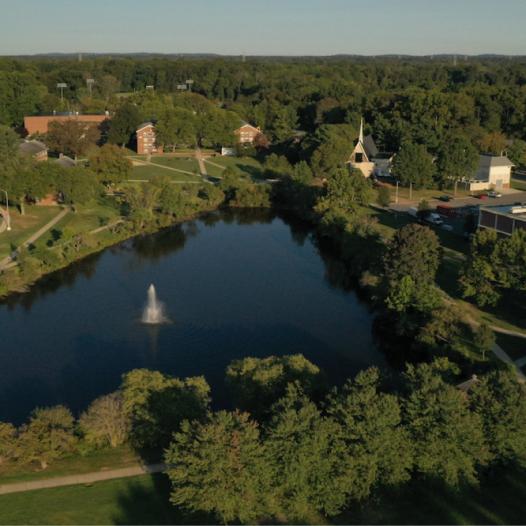Thursday, Nov 5, 2020
Dr. Elizabeth Hawthorne teaches students how to prevent and investigate cybercrimes
by Rachel Stengel '14, '20
"People who work in computer science and cybersecurity aren't simply nerds sitting in a cube all day," says Dr. Elizabeth Hawthorne, adjunct assistant professor of computer science/cybersecurity. "You can do a lot to improve the world."
Hawthorne, who joined Rider's faculty this fall, feels a sense of duty to educate the next generation of — as she fondly calls her students — "cyber warriors." Hawthorne says cybersecurity is akin to crime fighting as it requires individuals to be able to thwart cybercrimes and investigate them afterwards, if they occur.
She has spent most of her academic life interested in the latter, which those in the field call cyberforensics. Cyberforensic investigators work to uncover clues after a security breach has happened and work closely with legal departments to present the electronic evidence toward prosecution of the cybercrime.
"Cybersecurity students will have the technical skills to 'lift the hood' off a computing system, so to speak, to find the digital smoking gun," she says.
Hawthorne is a distinguished member of the Association for Computing Machinery (ACM), the world's largest educational and scientific computing society. She serves as a consultant for the National CyberWatch Center, a consortium of higher education institutions, businesses and government agencies. The Center's collaborative efforts focus on advancing information security education and strengthening the national cybersecurity workforce.
Her work on multiple ACM committees and National Science Foundation grant teams has led to the creation of computer science and cybersecurity curricular frameworks that are used by colleges and universities throughout this country and around the world.
The ACM computer science curriculum caught the attention of Dr. John Bochanski, chair of the Department of Computer Science & Physics, while developing Rider's undergraduate program in 2016. Hawthorne served as a subject matter expert for both the computer science bachelor's and cybersecurity master's programs, prior to joining the faculty. The master's program is completely online and offers both cybersecurity and cyberforensics courses.
Hawthorne's connection to Rider began as an undergraduate student studying decision science and computers as well as management science. She recalls late nights in the lone computer lab on campus surrounded by other students feverishly typing in and compiling FORTRAN programs on a mainframe computer terminal. Back then, homework was printed out and handed in, she says.
"Rider has definitely kept pace with technology over the years. At the time, mainframe computers were modern, but I can do more with my smartphone today than I could back then," Hawthorne says.
Originally aspiring to be an oceanographer, Hawthorne appreciated the strong foundation Rider provided in science, math and computing as it led her to pursue the evolving field of computer science and eventually cybersecurity. As an educator, Hawthorne strives to ensure that students are learning the latest topics in a rapidly changing field.
"I always instill in my students that you must continue learning," she says. "Cybersecurity changes quicker than computer science. You go to bed and wake up two years behind if you're not continuously educating yourself."

People who work in computer science and cybersecurity aren't simply nerds sitting in a cube all day. You can do a lot to improve the world.
The first curriculum guidelines for computer science were developed in 1968 by ACM and are updated about every decade, according to Hawthorne. As the field has evolved to encompass a number of sub-disciplines, including cybersecurity, the latest computer science guidelines will include artificial intelligence and machine learning.
"There's no way that I could have predicted that I would be studying these things as an undergraduate student at Rider," she says.
According to the international nonprofit Women in Cybersecurity (WiCyS), Hawthorne is one of just 13% of women in the field of cybersecurity. She says the field is becoming more attractive to women because of organizations like WiCyS and ACM-W(omen) that help build a professional support network and provide mentoring opportunities for young women.
"Research shows that women are attracted to professions that make a difference," she says. "Working in cybersecurity you realize that you can defend and protect others from cyber breaches and crimes."
As an advisory board member for the first national WiCyS conference, Hawthorne is helping to move the needle on the number of women pursuing rewarding careers in cybersecurity.
"We've grown leaps and bounds from when Women in Cybersecurity first began about five years ago," she says. "There were about 50 women at the first conference and the most recent one exceeded over 1,000 attendees."
In addition to her bachelor's from Rider, Hawthorne earned a master's in management systems analysis from Kean University and a doctorate in computer information systems from Nova Southeastern University. She also completed a post-doctoral fellowship at the University of Maryland in digital forensics and cyber investigations.
She holds the highly-respected Certified Information Systems Security Professional (CISSP) and Certified Computer Forensics Examiner (CCFE) professional certifications. She currently serves as a co-chair of the ACM Education Board, previously holding a number of leadership positions within the organization and other professional associations. She is an ACM Distinguished Educator and has received outstanding service awards.

